SLED chief pays hemp farmer’s attorney $11,300 sanction for discovery misconduct in hemp farm raid
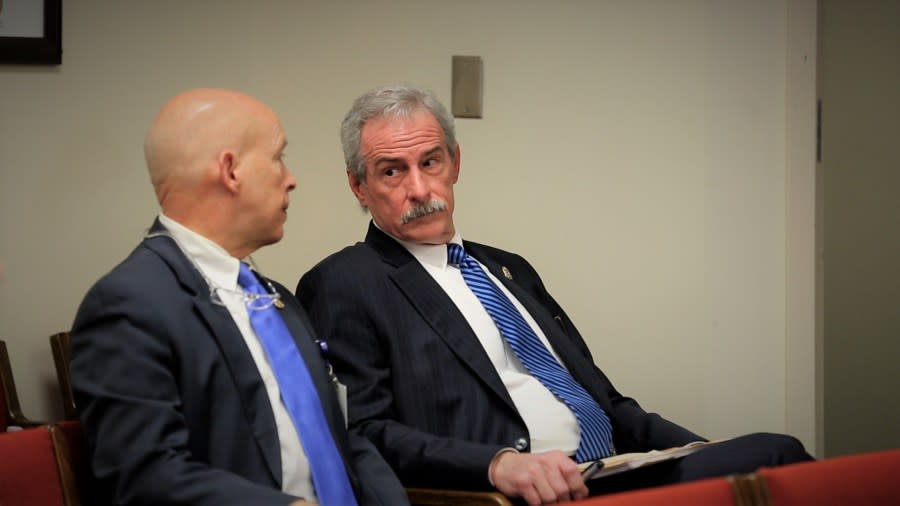
COLUMBIA, SC (Queen City News) — It was nearly a year ago that a Dorchester County judge slapped a $11,307.36 sanction on Chief Mark Keel, the head of South Carolina’s top law enforcement agency for a list of discovery abuses arising from his agents’ decision to destroy a hemp farmer’s crop in September 2019.
Dorchester County Circuit Court Judge Maite Murphy sanctioned Keel in February 2023 after listening to arguments from the farmer’s attorney that Keel, who heads the South Carolina Law Enforcement Division (SLED), kept discovery evidence from the farmer after the farmer sued SLED following the raid.

Trent Pendarvis’ attorney, Patrick McLaughlin, told Murphy that SLED failed to disclose records showing what went on between state police agents, the SC Department of Agriculture, and the SC Attorney General’s Office in the weeks leading up to the raid. McLaughlin argued SLED and Keel failed to turn over documents, failed to disclose all communications and meetings related to the case, and gave incomplete responses to the farmer’s legal team.
The judge agreed with McLaughlin, ordering Keel to pay the Florence attorney $11,307.36 for what Murphy described as “intentional, willful, and bad faith conduct,” according to the Feb. 28, 2023, order sanctioning Keel.
02282023-KEEL-DISCOVERY-VIOLATIONS-ORDERDownload
“I find that Keel’s conduct regarding discovery in this case has been dilatory, prejudicial, willful, intentional and in bad faith and his responses have been false, misleading, and incomplete…Despite the clear and plain language of the rule requiring answers under oath, and the specific requests by the Plaintiff that requirement be complied with, Keel has failed to comply with Rule 33. The Plaintiff has served Keel with four (4) sets of interrogatories. During the hearing, Keel conceded to only producing Rule 33 verifications for two (2): the 2nd and 3rd set of interrogatories.”
Judge Maite Murphy, Feb. 28, 2023, order for sanctions against SLED Cheif Mark Keel
The judge also noted in her Feb. 28 order that Keel withheld “numerous communications” sent from the agency’s taxpayer-funded email server that contained Pendarvis’ name.
“Emails in the record that Keel did not identify or produce, were sent from and to “sled.sc.gov” email addresses. Keel is the Chief Law Enforcement Officer of the State of South Carolina. It is inconceivable that Keel does not have the knowledge and capability to execute a keyword/term search of his agency’s digital email archives to identify and obtain every email communication that would be responsive to the Plaintiff’s discovery requests. The record reflects Keel failed to do so,” Murphy wrote in the February 2023, sanctions order.
On March 10, 2023, Keel asked Murphy to reconsider her sanctions. On April 5, Murphy issued a two-sentence order denying Keel’s request to reconsider the sanctions imposed against him and SLED.
Keel had 30 days to comply with Murphy’s Feb. 28, 2023, order or be held in contempt of it. But at 4:07 p.m. on the final day to respond, Keel and his taxpayer-funded attorney, Andrew Lindemann, filed an appeal of Murphy’s orders with the South Carolina Court of Appeals.
Keel’s appeal, among other requests, sought to have his name removed from the sanction order, replacing “Keel” with “SLED.” The SC Appeals Court and later the SC Supreme Court denied Keel’s request to undo Murphy’s sanction order, including removing his name from the filing.
“The timing of the appeal is neither accident nor happenstance,” McLaughlin wrote in a May 8, 2023, motion asking the appeals court to dismiss Keel’s appeal.
09182023-SLED-PETITION-FOR-WRIT-OF-CERTIORARIDownload
The farmer’s attorney argued SLED filed the appeal to further delay litigation that’s already spanned three years.
“This appeal was intentionally filed right before that deadline for compliance to avoid the Appellant being in contempt of the trial court’s order and subject to further sanctions for that contempt. This appeal was intentionally filed in that improper manner despite this Court having previously instructed in Funny on the proper way to appeal such an order: be found in contempt pursuant to Tucker and appeal the contempt order,” McLaughlin wrote in the May 8 motion.
“In a case in which the very order being appealed found Appellant to have engaged in conduct that was dilatory, prejudicial, willful, intentional, false, misleading, incomplete and in bad faith, resulting in clear, convincing and substantial evidence that the Respondent was prejudiced by having to unnecessarily expend substantial time and resources, this improper and frivolous appeal itself warrants sanctions,” McLaughlin wrote.
The appeals court ultimately agreed with McLaughlin and handed down an order on July 10, 2023, dismissing Keel’s appeal, finding Murphy’s order “is not immediately appealable,” meaning Keel must first be found in contempt of the order before he could appeal. The appeals court order cited three S.C. Supreme Court cases establishing legal precedence that discovery orders are “interlocutory” and “not immediately appealable.”
Keel and Lindemann filed a Writ for Certiorari, asking the SC Supreme Court to overtirn the appeals court ruling, finding Judge Murphy made multiple errors in her sanctions order and to overturn the sanctions against SLED Chief Mark Keel.
On Dec. 13, 2023, the SC Supreme Court denied Keel’s request to review his appeal. The case was sent back to Dorchester County and the Murphy sanction order imposed on Keel and SLED was reinstated. That order forced Keel to pay the $11,307.36 sanction and to hand over records withheld from Pendarvis.
The SC Supreme Court order wasn’t made public until Dec. 27, 2023.
12272023-DENIAL-OF-KEEL-APPEALDownload
The high court agreed with McLaughlin’s initial argument that Keel couldn’t appeal Murphy’s order until – and only until – he was found in contempt of it. Keel and Lindemann filed the appeal just before the deadline which could have placed Keel in contempt.
“Petitioner (Keel) seeks a writ of certiorari to review the court of appeals’ dismissal of the underlying order of the circuit court on the ground that the discovery order was not immediately appealable. Because the court of appeals correctly held the discovery order was not immediately appealable, we deny the petition,” the Dec. 13, 2023, Supreme Court order stated.
The order was signed by Chief Justice Donald Beatty and four other justices.
The justices also ordered Judge Murphy to “amend” her discovery order to allow SLED to keep secret the contents of agents’ personnel files related to the Pendarvis raid – only releasing those records to attorneys in the Pendarvis lawsuit. Most of the information in a personnel file – except for information that would constitute an “unreasonable invasion of personal privacy” (S.C. Code 30-4-40(a)) – of public employees in South Carolina, including law enforcement officers, is a public record under the SC Freedom of Information Act.
The SC Court of Appeals further solidified the public’s right to access law enforcement personnel files in a case titled ‘Burton v. York County Sheriff’s Office’ from 2004. In the Burton case, a newspaper filed a FOIA request for personnel files of a group of deputies suspended without pay, but the sheriff released only the hire date, rank and title, and salaries for each deputy. The court found the sheriff’s office illegally withheld the remainder of the files.
The sheriff’s office claimed the information “was of a personal nature and disclosing it would constitute an unreasonable invasion of personal privacy,” according to the appeals court order.
The court found the sheriff’s office’s use of the privacy exemption did apply to those law enforcement personnel files.
“In the present case, we find the manner in which the employees of the Sheriffs Department prosecute their duties to be a large and vital public interest that outweighs their desire to remain out of the public eye. The newspaper, in fulfilling its obligation to report on and hold to account those in public service, had a legitimate need to access the records Burton requested. Burton and the newspaper did not seek information regarding the off-duty sexual activities of the deputies involved. Rather, the access to information they sought and the trial court granted was focused on the performance of public duties by the Sheriff and his deputies and the response of the Department to allegations of misconduct by the deputies.”
SC Supreme Court published opinion #3771
Chief Justice Beatty’s name is signed to the bottom of the Burton v. York opinion, confirming his concurrence with the opinion.
However, as Chief Justice of the SC Supreme Court, Beatty signed off on the December 2023, order telling Judge Murphy to provide protection to the SLED personnel files, which appears to be in direct conflict with Beatty’s findings in Burton v. York.

On Jan. 2, 2024, we emailed Beatty, asking him to explain the conflict in his two judicial decisions; the latest appearing to hold a SLED agent’s personnel file to a confidentiality provision where the state’s own open records law doesn’t provide any such protection.
Beatty did not respond to our request to clarify his judicial positions on law enforcement personnel files.
Murphy gave Keel until Jan. 26, 2024, to comply with her demand that SLED hand over any record associated with its handling of Trent Pendarvis’ investigation and prosecution, including the SLED personnel files.
The farmer’s civil rights lawsuit will now continue where it stopped last April when Keel filed his appeal. The likely next steps would include work toward depositions, further discovery and a trial if both sides are unable to reach a settlement before trial.
We asked Keel whether he personally paid the $11,307.36 sanction or whether taxpayers footed the bill. SLED’s media office confirmed taxpayer’s paid the sanction, responding on Keel’s behalf with this statement: “To be clear, Chief Keel was and is named as a defendant in this action only in his official capacity as the Chief of SLED. As such, the attorney’s fees and costs awarded by Judge Murphy were not assessed against Chief Keel personally nor did he personally pay them. Rather, the amount was paid by SLED’s insurance carrier, the South Carolina Insurance Reserve Fund,” SLED spokeswoman Renee Wunderlich wrote in a Jan. 2, 2023, email to QCN.
The Dorchester County case docket also shows in July, five months after Keel was sanctioned, Andrew Lindemann was removed as Keel’s defense attorney. The order does not state the reason for Lindemann’s removal, other than “Upon motion by Defendant Mark Keel, in his official capacity as Chief of the South Carolina State Law Enforcement Division…”
Lindemann was replaced by Daniel C. Plyler, according to the substitution of counsel order signed by Judge Murphy on July 18, 2023.
We asked Keel why he removed Lindemann, but in the SLED statement, Keel refused to explain his decision to remove Lindemann, “Further, SLED will not discuss any attorney-client privileged conversations or communications between SLED’s former or current attorneys,” Wunderlich wrote.
We also sent an email to the address listed for Lindemann on electronic court filings in the case seeking his explanation for his removal. Lindemann did not respond to our request.
Keel joined SLED in 1979 and later left to head the SC Department of Public Safety. Keel left SCDPS in 2011 when he rejoined SLED as chief following his appointment to a six-year term by then Governor Nikki Haley. Keel was reappointed in 2018 by Governor Henry McMaster.
On Dec. 7, 2023, six days before the SC Supreme Court’s decision on Keel’s appeal, McMaster announced he was appointing Keel to another six-year term. The SC Senate will have to confirm the chief’s reappointment when the legislature reconvenes later this month.
The month after Murphy’s sanction order, we found McMaster at a public function to ask him about the discovery misconduct allegations against his cabinet appointee.
The entire exchange between Barr and the governor can be seen here:
McMaster defended Keel, saying the lifelong lawman has “a terrific reputation.”
McMaster admitted he never read the sanctions order against Keel, but that he “just read newspaper reports” about the hemp farmer’s case. McMaster also would not take a copy of the order from Barr during the March 2023 interview with the governor.
“In the judge’s order, she writes, ‘I find that Keel’s conduct regarding discovery in this case has been dilatory, prejudicial, willful, intentional, and in bad faith, and that his responses have been false, misleading and incomplete,’” Barr said to the governor reading Judge Murphy’s quote from the lawsuit. “I read some of those words, but again, that’s, that’s the judges order and she’s doing her job. Chief Keel’s been in law enforcement a long time. He has a terrific reputation. His whole organization does, but again, this is a civil lawsuit and it’s going through the proper steps,” McMaster told QCN.
During our ‘Seize and Destroy’ investigation, law enforcement sources told us about a SLED policy, telling agents they “shall be truthful and use candor in all official matters.” SLED later provided copies of the policies to us.
The policy originally went into effect on March 1, 1992 and was revised on Oct. 1, 2007. The 2007 version of the policy was signed off by SLED Chief Mark Keel. The policy was again revised on Sept. 4, 2020 under order of Mark Keel.
McMaster appeared to have never heard of the policy when we interviewed him in March 2023 and interrupted our questions about whether Keel adhered to his own policy and who holds a cabinet appointee accountable.
Here’s a transcript of that portion of our interview:
BARR: “The last question I have for you is, there’s a – SLED has a truthfulness policy…”
GOVERNOR: “Has a what?”
BARR: “Truthfulness policy, and it was signed by Chief Keel, 2021…it was updated, and it says in that policy, ‘Employees shall be truthful and use complete candor in all official matters, whether in the course of appointment or otherwise—”
GOVERNOR: “I understand and of course, there are always two sides, every story and that’s what the judicial system is for. Chief Keel has been a respected law enforcement officer for many, many years. I’ve worked with him for many, many years. I have confidence, high confidence in him. Of course, the judge has a good reputation. But that’s what the legal system is for is to sort these things out in a methodical procedure that is set by law and that’s what’s happening.”
BARR: “Who should hold Chief Keel accountable for what—”
GOVERNOR: “How many times you gonna ask that same question?”
BARR: “Who holds him accountable?”
GOVERNOR: “That’s what the judicial system is for.”
Keel, who has denied every request to be interviewed about this case and the allegations against his agency, would not agree to be interviewed for this report.
THE RAID
Agents arrested Pendarvis in the middle of his hemp field on Sept. 19, 2019. SLED’s body camera recordings from the raid show the raid had the blessings of the agency’s leadership. In fact, Major Frank O’Neal, who heads SLED’s drug unit, was standing in Pendarvis’ field that day and gave the order to arrest the Dorchester County farmer.
SLED agents, armed with SC Forestry Commission heavy equipment, swarmed Maple Hill Road and raided Trent Pendarvis’ hemp plot. The raid ended with the farmer sitting in a Dorchester County Sheriff’s Office patrol car with his hands cuffed behind his back.
SCFC workers used large tractors with bush hogs to mow the farmer’s crop down during the 2019 raid. SLED Major Frank O’Neal also got in on the action as SLED body camera recordings show O’Neal using a bush axe to chop hemp plants down while what appeared to be another SLED agent smiling while using a cell phone to record O’Neal’s destruction work.

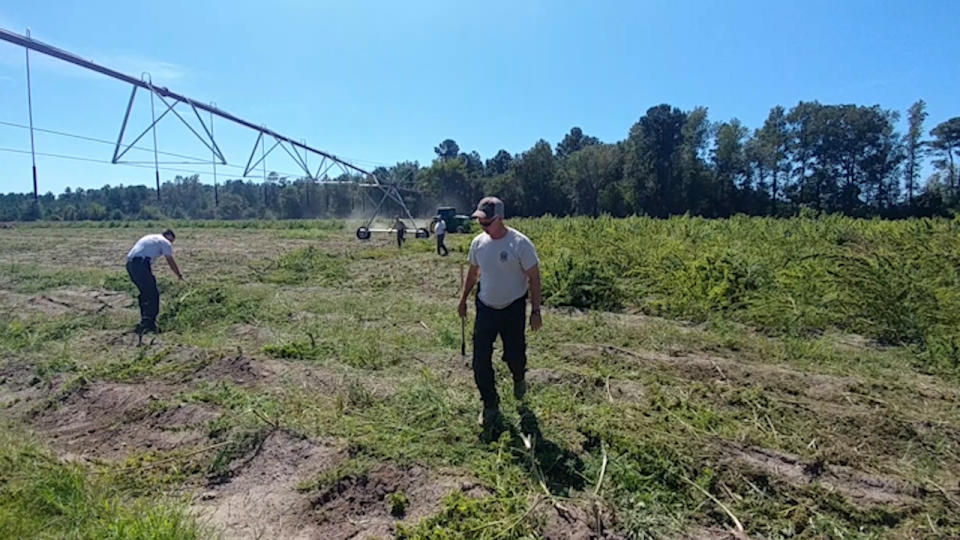
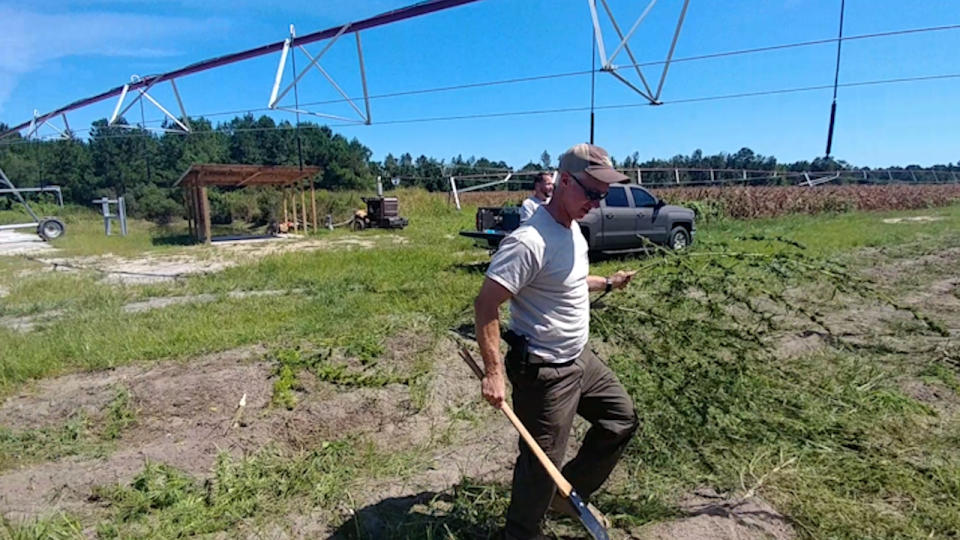

SLED agents accused Pendarvis of growing hemp without a license, although the farmer was awarded a hemp grower’s license by the SC Department of Agriculture in May 2019 – more than four months before the SLED raid. Pendarvis filed coordinates for the two fields he planned to plant the hemp in, but the farmer told Queen City News Chief Investigator Jody Barr during an interview in September 2022, that the fields he originally planned to use were unusable.
Pendarvis also told SCDA officials the same when he tried to amend his acreage allotment weeks before the raid.
Pendarvis said a drought and heavy rains forced him to plant his hemp seedlings in different fields other than the ones he listed on his original application. Records obtained by QCN show Pendarvis attempted to amend his plot locations in the weeks leading up to the raid, but instead of allowing him to amend his coordinates, the SC Department of Agriculture emailed SLED on August 6, 2019, asking the law enforcement agency to investigate the farmer.
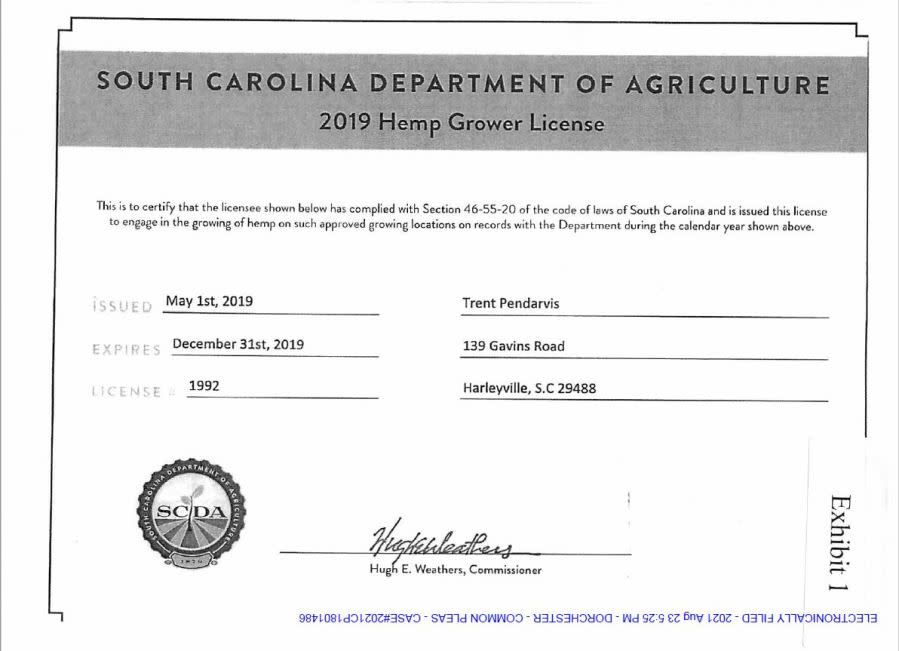
SLED acted quickly, opening an investigation and emailing the SC Attorney General’s Office for a legal opinion on August 6, 2019.
At some point after the raid, agents planned to seize and destroy a second field holding a portion of Pendarvis’ hemp allotment. However, Pendarvis’ attorney, Patrick McLaughlin, was able to stop SLED after filing a request for an emergency restraining order. A judge granted the restraining order, allowing Pendarvis to harvest the crop and any revenue made off the harvest placed into a trust account until both SLED and Pendarvis could have their day in court.
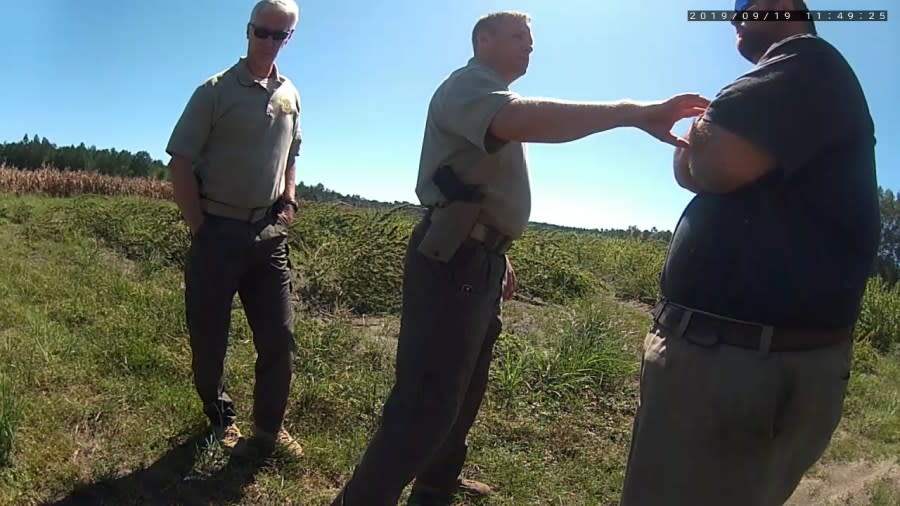
On the day of the raid, SLED filed a single charge against the farmer: Unlawful Cultivation of Hemp – 1st Offense. Within minutes of being freed from jail, Pendarvis went on the hunt for legal help.
The farmer hired Brad Hutto, a state senator out of Orangeburg. Hutto immediately hired McLaughlin, a civil rights attorney who has successfully sued state and local government agencies in South Carolina in civil rights claims.
On July 25, 2022, the First Judicial Solicitor’s Office filed a letter, finding SLED could not prove what Pendarvis did was “not merely a mistake.” The prosecutor dismissed the charge against the farmer.
“By cultivating hemp plants in a field that was not approved by SCDA, Defendant (Pendarvis) clearly violated the provisions of the Act. As such, probable cause existed to issue an arrest warrant for Defendant on the basis of these violation. However, it is also apparent from the circumstances discussed above that the State would be unable to prove beyond a reasonable [sic] that the Defendant’s actions were willful. For the foregoing reasons, this case will be dismissed.”
David L. Osborne, First Judicial Circuit Senior Litigation Counsel
07252022-PENDARVIS-CHARGE-DISMISSAL-MEMODownload
The following month, Trent Pendarvis sued SLED, the Dorchester County Sheriff’s Office, and the SC Forestry Commission whom SLED summoned to the hemp field to destroy it.
That lawsuit would begin to unearth what Pendarvis and his legal team believe was a conspiracy to use the Dorchester County farmer in a political fight against the legalization of cannabis in South Carolina.
‘CONSPIRACY’ TO CHARGE PENDARVIS & DESTROY HIS CROP
Within hours of the SCDA’s July 2019 inspection of Pendarvis’ hemp farm, records obtained by Pendarvis’ attorneys through discovery in two separate state-level civil lawsuits show the SCDA went to work to figure out how to enforce what it alleged was a violation of the state’s six-month-old Hemp Farming Act.
The Act, located in Title 46, Chapter 55 of the SC Code of Laws, states a hemp farmer cannot be charged with a crime or fined for violations, “The corrective action plan…is the sole remedy for negligent violations of this chapter, regulations promulgated pursuant to this chapter,” the law states. “A licensee who negligently violates a provision of this chapter, regulations promulgated pursuant to this chapter, or the state plan shall not be subject to any criminal or civil enforcement action.”
Not only was Pendarvis arrested and charged, but SLED coordinated with the SC Forestry Commission the day before the raid to have the SC Forestry Commission bring heavy equipment to Pendarvis’ farm to destroy every hemp plant on the farm.
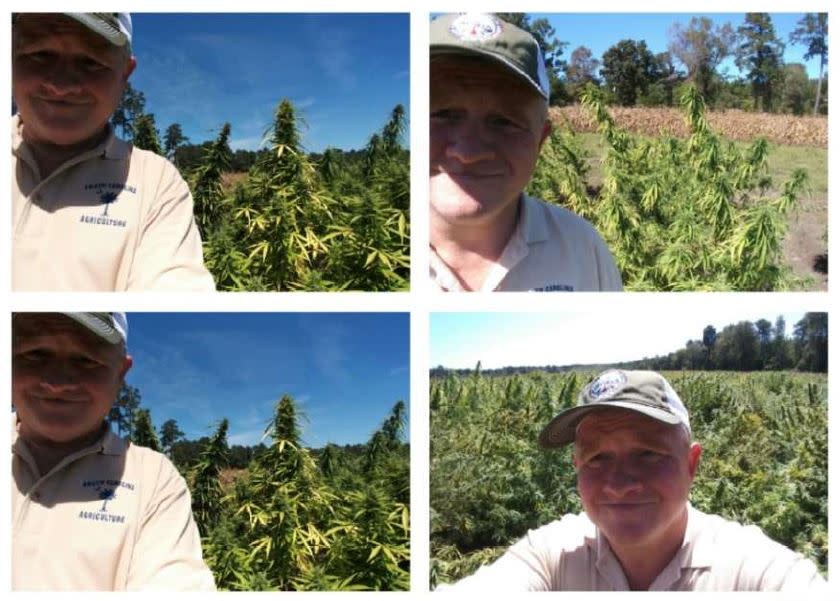
An email from SLED Lt. Jason Wells to SLED General Counsel Adam Whitsett, Major O’Neal, Captain Wood, and Neale shows Wells planned to ask someone he knows at the SCFC to bring the equipment to Dorchester County the morning of the raid and to meet SLED agents to destroy the hemp crop.
Video recordings obtained by Pendarvis’ attorneys show SCFC equipment waiting in the field for SLED’s command to begin cutting the hemp down. Discovery records also included photographs of SCDA Program Manager John Stokes taking selfies in Pendarvis’ hemp field during the raid.
The day following the SCDA inspection in July 2019, Pendarvis emailed the Ag department the coordinates of his hemp plot and an explanation as to why he planted the crop in a different location than he initially filed with his application months earlier.
“Due to the extensive drought in May and overabundance of rain in June, I was prohibited to plant the fields that were previously reported with GPS coordinates. I didn’t realize the field was not reported since multiple fields were listed in case weather events delayed planting and thought everything would be finalized during inspection. It was an oversight for not reporting the change to you. The additional field is located in a 2-mile radius of existing fields and did not increase the acreage approved,”July 31, 2019 email from Pendarvis to Derek Underwood, an SCDA Assistant Commissioner.
July 31, 2019 email from Pendarvis to Derek Underwood, an SCDA Assistant Commissioner.
Pendarvis’ email also included the coordinates of the field he said he asked the SCDA to add an amendment to his application. SCDA emails show the agency did not update Pendarvis’ records, instead sending him a letter informing him the agency found he “willfully violated” the Act.
On August 5, 2019, emails obtained by Pendarvis’ counsel show SCDA Assistant Commissioner Derek Underwood emailed SLED Captain Jason Wells asking for a criminal investigation and enforcement action against the farmer.

The following day, SLED’s General Counsel Adam Whitsett emailed the SC Attorney General’s Office asking for a legal opinion, indicating the state’s Hemp Farming Act didn’t clearly lay out how SLED was to enforce violations, “There is no specific direction as to the process or procedure to have the illegally grown hemp, which is contraband per se, seized or destroyed. Accordingly, SLED would greatly appreciate any specific guidance you can provide on the proper procedure in this matter,” Whitsett wrote in an Aug. 6, 2019, email to David S. Jones, an Assistant Attorney General in the SC Attorney General’s Solicitor General Division.
Underwood emailed SLED again two days after filing the violation allegation against Pendarvis, asking for an update. This time SLED Major Frank O’Neal responded.
“Not yet – we are having difficulty in what to address with so many gray areas concerning enforcement. Unlike Kentucky, we don’t really have comprehensive regulation that addresses all of the possible concerns. We are having to get AG opinions along the way and the last thing we want to do is an action that will be perceived in a negative light by the media or general assembly.”
SLED Major Frank O’Neal wrote to Derek Underwood in an August 8, 2019 email.

The email trail between SLED, SCDA, and the SCAG’s offices shows the back-and-forth between the agencies, each trying to figure out how to handle the “ultra murky” law SLED was about to enforce. “Ultra murky” is the language Bob Cook, the AG’s Solicitor General, used to describe the SC Hemp Farming Act of 2019.
“It gives no direction whatever [sic] to law enforcement,” Cook wrote in an August 7, 2019, email to Assistant Attorney General David Jones.
The next day, on August 8, 2019, AG records show Cook and Jones published the opinion SLED asked for, describing it as ‘An opinion on the appropriate procedure to pursue enforcement of the Hemp Farming Act with respect to hemp grown in violation of the Act.” The opinion is still live on the AG’s website today.
08082019-WhitsettA-OS-10384-FINAL-Opinion-8-8-2019-02062432xD2C78-02064672xD2C78Download
“It is the opinion of this office that in the absence of legislative direction, SLED should seek judicial authorization for the seizure of legally-grown hemp in order to ensure that the grower receives due process consistent with the Constitutions of the United States and the State of South Carolina,” Solicitor General Robert Cook wrote.
“Given the absence of any legislative direction in the Hemp Farming Act, we advise that the prudent course of action would be to provide that opportunity in a hearing. We hope that this also will lead to judicial clarification of some of the many questions created as a result of the Hemp Farming Act,” Cook continued in the legal opinion.
Emails obtained by Pendarvis’ legal team show SLED attempted to seek approval from a circuit court judge to destroy Pendarvis’ crop following the AG’s opinion. On Sept. 11, 2019, SLED General Counsel Adam Whitsett emailed Circuit Court Judge Diane Goodstein, asking her to meet with SLED agents to “discuss” a “proposed Hemp/Marijuana Seizure Order and Order of Destruction in the hope that the Judge will sign it,” Whitsett wrote.
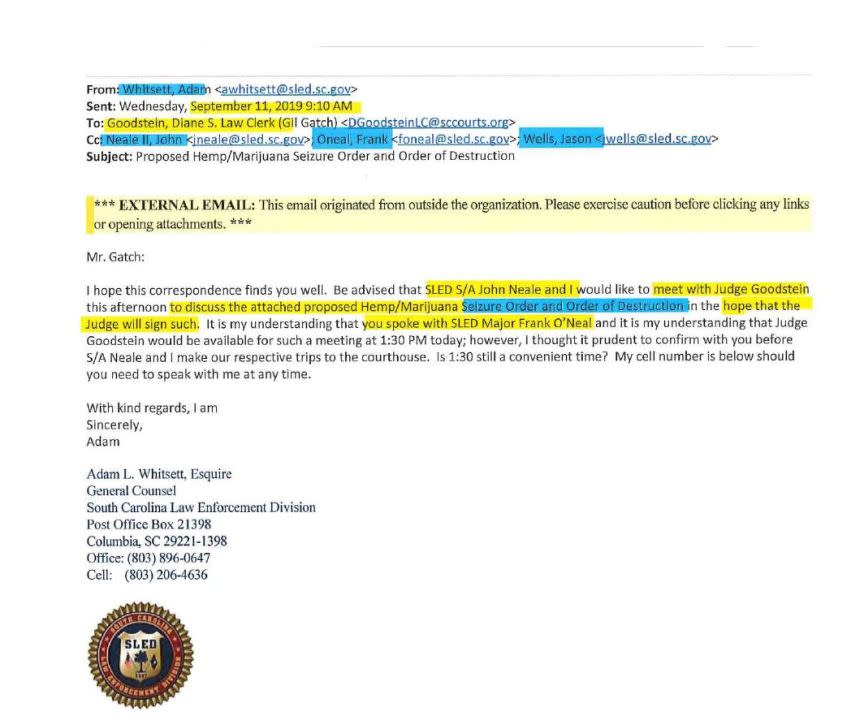
The email also showed SLED Major Frank O’Neal had already spoken with Gil Gatch, Judge Goodstein’s law clerk at the time. Gatch is now a current member of the SC House of Representatives and did not return messages seeking comment for this report.
O’Neal contacted the judge’s office to find out the judge’s availability to meet with SLED agents, according to the emails obtained through discovery. The judge’s office responded to Whitsett six hours later.
“The judge has reviewed your proposed order and has decided not to sign it,” Gatch wrote in a Sept. 11, 2019, reply to Whitsett. “She told me to let you know that if you would like a hearing on the matter, she would be glad to give you one,” Gatch wrote in closing the email.

But Whitsett declined the judge’s offer to give Pendarvis a hearing. “Please let the judge know that we appreciate her consideration and do not anticipate needs a hearing on this matter at this time,” Whitsett wrote to Gatch and Goodstein more than an hour later.
Emails Pendarvis’ legal team obtained through discovery show that eight days later, SLED Agent John Neale went to a lower court to ask a magistrate judge for an arrest warrant for Trent Pendarvis.
SLED would later serve that warrant on Pendarvis, and then destroy his hemp crop.
“Judge said, I’m available, courtroom’s open, you certainly are entitled to a hearing, notify the farmer and come on up here. They (SLED) didn’t like that. They wanted to go around that,” Pendarvis attorney Brad Hutto told QCN last month.
“In reality, SLED was going around the Attorney General and around the judge, all for what? To go after Trent Pendarvis. Why?” Hutto asked.
‘SLED’S OBSTRUCTIONIST CONDUCT’
After SLED filed its appeal of the Marion County decision, Pendarvis’ attorneys spent the next several months fighting with SLED, the Attorney General, the Ag Department, and other state agencies trying to gather discovery records and evidence to show what happened behind the scenes in the weeks and days before SLED raided Pendarvis’ farm.
Pendarvis’ attorneys described SLED’s handling of Pendarvis’ criminal and civil cases as “obstruction of justice” in what the attorneys labeled as “discovery misconduct” in the agency’s intentional withholding of some of the evidence it had related to the Pendarvis raid.
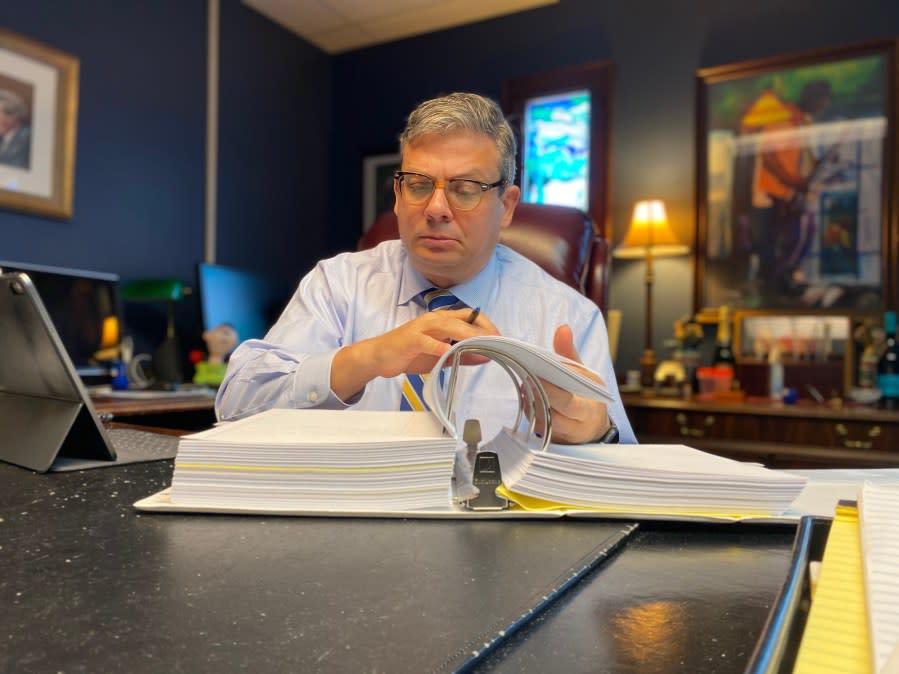
“This conduct includes willfully attempting to mislead a state court judge to authorize their seizure and destruction action, conspiring to seize and destroy the Pendarvis’ property after that state court judge had refused to authorize such, then denying that the state court judge had refused to authorize the seizure and destruction of the Pendarvis’ property and the willful and intentional obstruction of justice through discovery misconduct in both the criminal and state court cases arising from these matters,” the attorneys wrote in the September 2022 federal lawsuit.
That lawsuit names 36 defendants who Pendarvis’ attorneys said had a hand in the communications and the on-site actions related to the September 2019 raid of Pendarvis’ farm.
The lawsuit points to a Sept. 30, 2019, attorney general opinion that amended the Aug. 8, 2019, opinion SLED received before raiding Pendarvis’ farm. The August opinion included language cautioning SLED against seizing and destroying Pendarvis’ hemp crop without affording him a hearing in court.
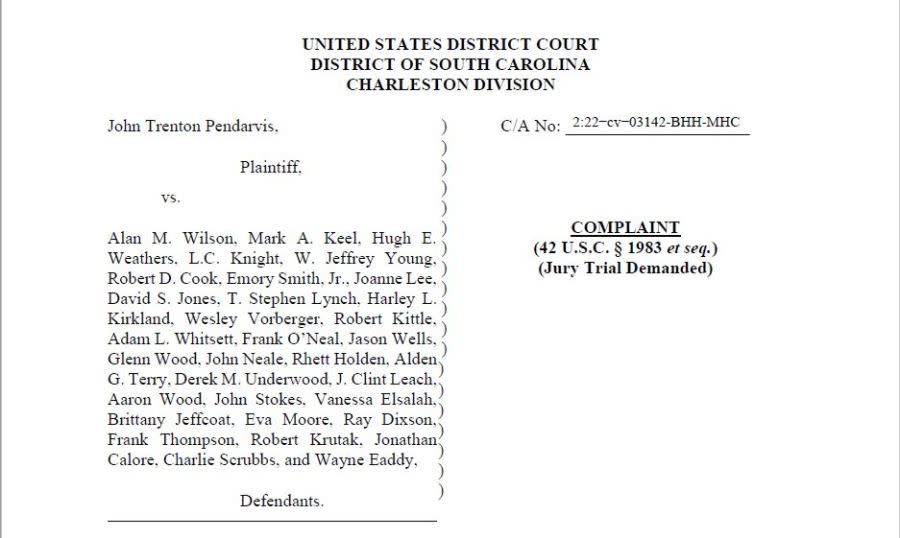
The amended opinion was published on Sept. 30, 2019 – 11 days after SLED raided Pendarvis’ farm and destroyed his hemp crop. The amended opinion included new information SLED provided the AG after SLED received a copy of the ‘Participation Agreement’ between the SCDA and Pendarvis. The agreement contains what the AG called “the consent to forfeiture and destruction,” supposedly allowing the state to destroy Pendarvis’ crop if found “growing in an area that is not licensed by SCDA,” the AG opinion stated.
SLED and the SCDA argued that Pendarvis waived his due process rights by signing the ‘Participation Agreement’ as part of his license to grow hemp.
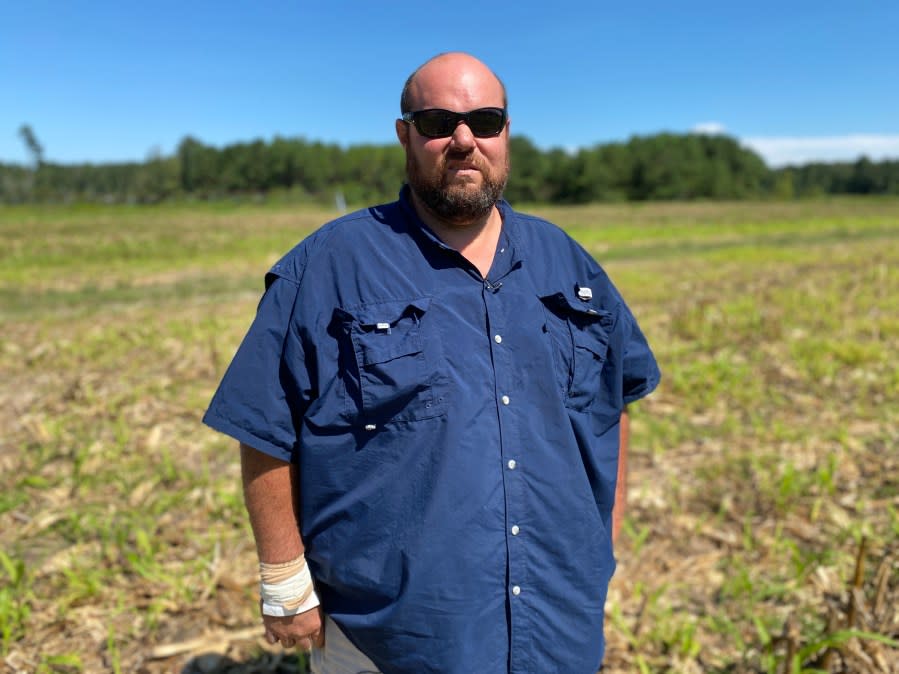
“The Defendants (SLED and the SCDA) want to take the participation agreement and elevate it to law,” Marion County Circuit Court Judge William Seals wrote in a Nov. 8, 2019 order leaving in place a restraining order barring SLED from destroying Pendarvis’ final two-acres of hemp crop in Marion County at the time.
“However, as the Plaintiffs argue, through that same participation agreement, Defendant SCDA acknowledges the reality of mother nature intruding on a farmer’s best-laid plans by providing for a hemp licensee to submit a “Permit Amendment Application,” Seals noted in his order. Pendarvis’ legal team said the judge was recognizing then that an agreement between a farmer and the SCDA would not trump a farmer’s right to face his accusers and be denied a chance to defend himself and his crop.
“Unlike purely contractual rights, constitutional rights cannot be extinguished or waived absent express agreement,” Seals wrote.
The Sept. 30, 2019, AG opinion also stated, “In addition, following the August opinion, SLED attempted to secure an order of destruction from a circuit court as discussed in the August opinion; however, the court would not entertain such. While no specific reasoning was provided by the court, there is simply no statutory or regulatory authorization for a court to entertain such a request,” AG Solicitor General Bob Cook and Assistant AG David Jones wrote in the September 2019 amended opinion.
09302019-KeelM-OS-10404-FINAL-Opinion-9-30-2019-02102586xD2C78-02107737xD2C78Download
But the emails Pendarvis’ attorney obtained in discovery show Judge Goodstein’s office did entertain SLED’s request for the judge to sign an order allowing SLED to seize and destroy Pendarvis’ crop when the judge’s law clerk offered SLED an opportunity of a hearing. SLED General Counsel Adam Whitsett declined the judge’s offer that same day, according to a Sept. 11, 2019, email between Whitsett and Goodstein’s law clerk, Gil Gatch.
Pendarvis’ attorney said SLED never mentioned the Sept. 30, 2019, amended opinion related to the Pendarvis raid in any of the responses SLED filed in the Marion County court case, according to a federal civil rights lawsuit Pendarvis filed against SLED, the AG, SCDA, SCFC, and the Dorchester County Sheriff’s Office on Sept. 16, 2022.
The lawsuit also states that SLED did not initially produce any of its Sept. 11, 2019, communications with Judge Goodstein in its discovery responses and that SLED did not truthfully answer interrogatories in the civil litigation Pendarvis filed related to these specific questions.
POLITICAL VICTIM IN SLED’S FIGHT AGAINST CANNABIS?
Part of what Trent Pendarvis’ attorneys got back through their discovery work was a series of cell phone and body camera videos from the day of the Pendarvis Farms raid. The cell phone video was recorded by state agents on the ground as Pendarvis’ hemp crop was mowed over.
The body camera recordings were made by SLED. Under South Carolina’s Freedom of Information Act, body camera recordings are not public records and unless a law enforcement agency, solicitor, or the SC Attorney General’s Office releases those recordings at each agency’s discretion, body camera recordings can be kept from the public forever.
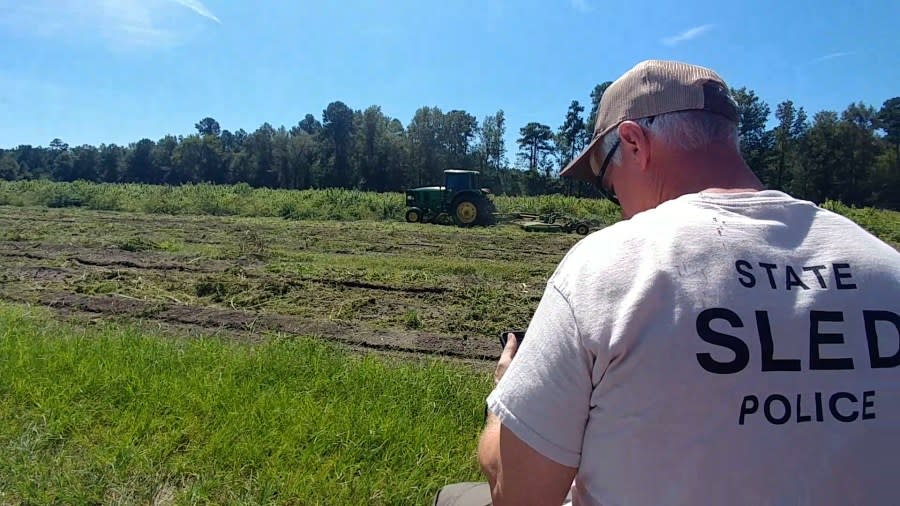
In this case, the recordings were released as evidence in Pendarvis’ lawsuit against the 36 people named in his federal civil rights lawsuit. Otherwise, those recordings might have never been made public.
Pendarvis’ attorneys think the reason SLED decided to go after Pendarvis had nothing to do with an alleged violation of the state’s Hemp Farming Act. “I think they wanted the photo up of the mowing it down, and they wanted the press release of we destroyed a crop,” Hutto told QCN last month. “They wanted to put that in the public realm, either to scare farmers or to further their war against the notion that there’s something evil about hemp and it’s all linked to marijuana.”
“SLED still, in their minds, got it that hemp is illegal. That hemp has got THC in it; therefore, it is marijuana,” Hutto said.
The lawsuit claims that SLED Chief Mark Keel and SC Attorney General Alan Wilson have “vehemently and publicly opposed” any attempt to legalize cannabis in South Carolina.
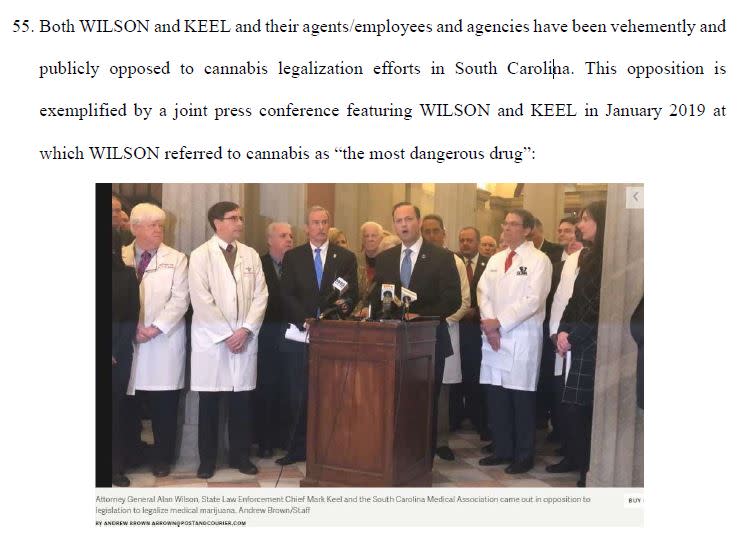
In January 2019, a Charleston newspaper quoted Wilson as calling cannabis “the most dangerous drug” at a State House press conference with Chief Keel looking on. The newspaper included a picture of the press conference and a caption noting Keel and Wilson “came out in opposition to legislation to legalize medical marijuana.”
Both Keel and Wilson were surrounded by members of the South Carolina Medical Association, according to the newspaper’s caption.
Even after Pendarvis’ arrest, Keel continued his public opposition to legalizing anything to do with cannabis. In a June 14, 2021, letter to members of the South Carolina Behavioral Health Services Association and the Department of Alcohol and Other Drug Abuse Services, Keel expressed his “disappointment” in the agencies’ lack of opposition to legislation aimed at legalizing marijuana in SC, according to the Pendarvis lawsuit.
“I have spent 43 years in law enforcement standing up for those who can’t stand up for themselves,” Keel is quoted as writing to the groups, “That is why I have consistently voiced my concerns about legalizing marijuana in any form,” the section of Keel’s letter included in the lawsuit stated.
The lawsuit also claims SLED Major Frank O’Neal “is a frequent speaker on behalf of Keel” lobbying the public against marijuana legalization “and the collateral damage it causes our country,” according to the lawsuit.
In January 2022, Keel went to York County to join York County Sheriff Kevin Tolson on a show titled ‘Crime to Court’ produced by members of the sheriff’s office. The episode included a cowboy hat-wearing Pinal County Sheriff Mark Lamb, who Sheriff Tolson said he “had to fly” Lamb into town for the 32-minute video.
All three appeared on the sheriff’s video to tell the public why state lawmakers legalizing medical marijuana was a bad idea.
“I’m proud to be here, as well; this is a topic that I think most people know that I have been very much opposed to here in South Carolina; I’ve pretty well made that very well-known and continue to oppose this bill that we’re going to discuss today,” Keel said looking into the camera.
Both Sheriff Tolson and Keel said they “voiced concerns” about the state passing the Hemp Farming Act, but lawmakers passed it anyway, and Governor Henry McMaster signed the Act into law.
Keel claimed in the video that 70% of the hemp products SLED’s laboratory tested out of the state’s hemp shops “are beyond the legal limit” of allowable THC content. “Which makes it makes it marijuana,” Keel said in the York County Sheriff’s video.
“And that was our concern that we let folks know about when we were debating that bill,” Keel said.
Keel went on to make a pitch against the legislature approving the 2022 medical marijuana bill making its way through the State House at the time, “I happen to be president of a national organization, Association of State Criminal Investigative Agencies,” Keel said in the York County Sheriff’s Office video.
“Every director from those agencies tell me, ‘Chief if you don’t have it, do everything you can to defeat this bill. It’s not good for your state, and there’s no need to put your children through the challenges of facing recreational, medical marijuana in South Carolina.’”
“SLED does not like the notion that the state is moving in a direction – first of legalizing hemp and possibly moving on to legalize marijuana. Look, I give them credit for this: they’ve said that, right? I mean, it’s not like it’s a hidden agenda; it’s an out-front agenda. They don’t like it,” Hutto said.
“The legislature heard that testimony and set the policy of this state by saying this is going to be legal. And it’s my opinion SLED just never accepted that. I mean, they never accepted that we’re the policymakers and they’re not,” Hutto said last month. “I think they were trying to send a message to farmers; you better stay away from this hemp farming because we’re going to come after you. We’re going to treat you like drug dealers, not like farmers.”
For the latest news, weather, sports, and streaming video, head to Queen City News.

